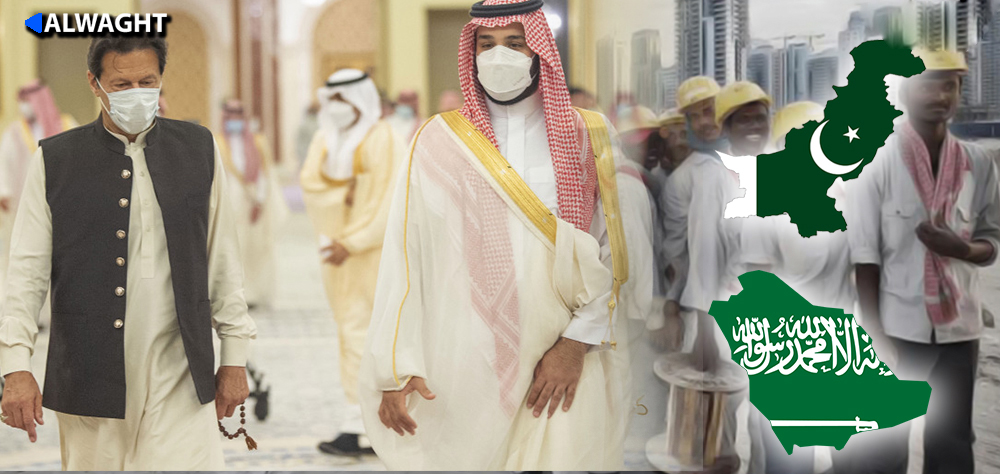Alwaght- The dominance of the dollar diplomacy on the Saudi foreign policy for decades has caused presence in a network of unstable regional and international, and especially in the Arab world, alliances for whose saving Riyadh had always to give economic privileges.
Pakistan is one of Saudi Arabia's most prominent allies in terms of dollar diplomacy but the disagreements between the two countries on bilateral, regional, and international levels have disclosed the fragility of the Saudi alliance.
In recent days, after a tumultuous period in relations between Riyadh and Islamabad, Prime Minister Salman Khan and prior to him the army chief Qamar Javed Bajwa visited Saudi Arabia, where they signed economic, political, and military cooperation agreements. The moves from media viewpoint was a new Saudi step to shore up the ties with Islamabad.
Founding High Coordination Council: Bin Salman's generosity amid home economic crisis
During the visit of the Pakistani PM to Riyadh, Imran Khan and Crown Prince Mohammad bin Salman signed an agreement to establish a High Coordination Council between the two countries to facilitate economic cooperation.
Last week, the Pakistani cabinet approved the establishment of such a council to "remove obstacles" ahead of the implementation of the investment agreements with Saudi Arabia signed during the bin Salman’s visit to Pakistan in 2019.
During the visit, MoUs were signed between the Saudi Development Fund (SFD) and Pakistan on drug trafficking and financing energy, infrastructure, transportation, water, and communications projects.
An estimated 2.6 million Pakistanis live in Saudi Arabia - more than 29 percent of all Pakistanis living abroad and the largest immigrant community abroad. Pakistanis make up about 7% of Saudi Arabia's population and are the second largest immigrant community in the country after India.
These migrants' remittances to Pakistan are considerable, with the State Bank of Pakistan (SBP) announcing in March that $2.7 billion in remittances were sent in by Pakistanis abroad. Last month, Khan wrote on Twitter: "The love and commitment of Pakistanis abroad to Pakistan is unparalleled. With COVID-19, you sent more than $2 billion directly in 10 months and broke all records. Your remittances in March "It rose to $ 2.7 billion, up 43 percent from last year. Your remittances are up 26 percent this fiscal year."
Of the total remittances, $ 1.6 billion, or 54 percent of the total, came from Persian Gulf Arab states, stated the SBP. This figure may be even higher, as many Pakistani migrants in the Persian Gulf use informal channels to send their income home. With this in mind, it is estimated that Pakistani remittances just from Saudi Arabia will exceed $8 billion in 2021 and reach $19 billion from all the six Persian Gulf Arab monarchies, which will account for about 7% of Pakistan's GDP.
These economic benefits to Pakistan come at a time Saudi Arabia is hit by an unprecedented economic crisis in decades due to falling oil prices, the coronavirus outbreak, and the extremely high costs of Yemen war, with Prince Mohammed as the de facto ruler of the kingdom resorting to austerity measures and even seizing the money of the rich royals to cut the deficit. The prince also projected in the Vision 2030 document increased use of local workers in the national economy as a way to fight unemployment, revealing the depth of the economic crisis in the wealthy country.
Dim outlook for settling political differences
As it was said, the main pillar of the Saudi-Pakistani alliance is Islamabad's economic needs and Riyadh's meeting them with privileges. Despite the new agreements that were signed between the two states, Imran Khan's visit could not tangibly bridge their gaps in regional cases.
The India-controlled Jammu-Kashmir is Pakistan's main security and foreign policy case, but the Saudis did not address it due to the significance of the trade ties with New Delhi. No tangible change to Riyadh stance on the case will happen in the foreseeable future.
From another aspect, Riyadh-Islamabad's military cooperation which is the main necessity behind Saudi alliance with Pakistan has been impacted by the Yemen crisis. When Saudi Arabia called for a coalition to invade Yemen in December 2015, Pakistan was among the top supporters, and General Raheel Sharif, the former chief of staff of Pakistan, was appointed as the coalition's first commander. However, this ostensible accompaniment did not last long, and with the bill of the Pakistani parliament, any participation of the Pakistani army in the Yemeni war was outlawed, dealing a fatal blow to the Saudi-led military coalition.
In other important regional cases, Pakistan has good relations with Iran, Qatar and Turkey as the most important regional rivals of Saudi Arabia, drawing criticism from the Saudis. In one case, Pakistan announced its readiness to attend a Kuala Lumpur summit of Muslim nations in December 2019, with Iran, Turkey and Malaysia in attendance, sparking outrage in Riyadh. In punishment of Islamabad, the Saudis called Pakistan to repay $3 billion of the $6.2 billion aid package.
In the new circumstances, despite the Bajwa visit and meeting with bin Salman and Deputy Defense Minister Khaled bin Salman and promising to maintain their alliances, Pakistan does not want to step into the Yemen quagmire as it holds home and regional concerns. Therefore, any improvement of relations with Islamabad should be read a Saudi show of flexibility accompanied by foreign policy walkback for adaptation to the new regional and international conditions.



























